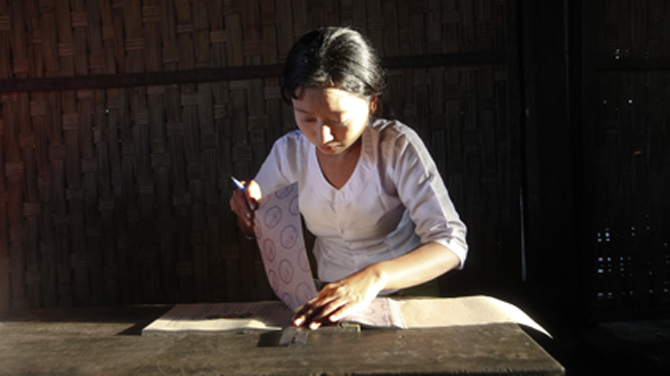Authorities Postpone By-elections in Restive North

RANGOON—Election authorities in Burma have postponed voting in three of 48 constituencies in the April 1 by-election because of what the military-backed government says are security concerns.
The postponement represents the first glitch in the upcoming poll, the first in which Nobel Peace Prize laureate Aung San Suu Kyi will be a candidate since the democracy icon was released from house arrest in 2010. The election is seen as an indicator of Burma's tentative transition from direct military rule.
State television broadcast an announcement Friday by the Election Commission that voting in three constituencies in Kachin State in northern Burma has been postponed as “security conditions are not conducive to conducting a free and fair by-election.”
It said voting would be held when security conditions have improved.
There is sporadic but sometimes fierce fighting in the area between government troops and ethnic Kachin rebels, who have long sought more autonomy and faced increased crackdowns this past year.
The April 1 by-elections are the first polls in which 66-year-old Suu Kyi's National League for Democracy party will be participating since boycotting a 2010 general election.
The United States said on Friday it was withholding judgment on the postponement until it gets more information from authorities in Burma, also known as Myanmar. The US and other countries are watching the polls closely as they weigh whether to ease sanctions imposed against the former military regime.
“We have had concerns about the violence in Kachin [State],” State Department spokeswoman Victoria Nuland told a news briefing in Washington. “We are seeking to understand what the Burmese intentions are so that the people of Kachin are not disenfranchised.”
The postponement of voting in Mogaung, Phakant and Bamaw is a blow to the Kachin autonomy movement because the former leader of the Kachin Independence Organization, Tu Ja, is running from Mogaung constituency as an independent candidate.
Kachin leaders who tried to form political parties to run in 2010 elections were barred from registering their political parties and were not allowed to run as independent candidates.
In 2010, the government also postponed the ballot in several areas facing ethnic unrest, leaving several parliamentary seats still unfilled.
Suu Kyi's party won a 1990 general election but was never allowed to take office. Its participation in the April vote—agreed to after the election law was changed to meets its objections—is seen as an endorsement of the reforms President Thein Sein has undertaken since taking office last year.
Thein Sein's military-backed but elected government has also negotiated ceasefires with several ethnic guerrilla groups. However, it remains at odds with the Kachin, who live in the strategic area by the border with China.
NLD spokesman Nyan Win called the postponement surprising and disappointing, since the party consider the areas its strongholds. Suu Kyi campaigned in Mogaung and Bamaw last month
“I don't see any security threats in these areas because I have been there,” he said.
Suu Kyi's party also has complained of election irregularities, including deceased persons still being listed on voting registries.
- Rangoon on List for Big Weather Disasters
- More Than 100 Orangutans Lost in Indonesian Fires
- North Korea Rocket Could Cause Casualties: US
- Police Bust Asian Human Trafficking Ring
- Vietnam Revokes Visas of Church Officials
- Tibetan Sets Himself on Fire at Anti-China Protest
- Monkey Importer Faces Cruelty Charges Over Thai Shipment
- Indian Rebels Release One of Two Italian Hostages
- India Lost $210 Billion on Coalfield Sales: Audit
- World Stocks Down on China Manufacturing Slowdown
